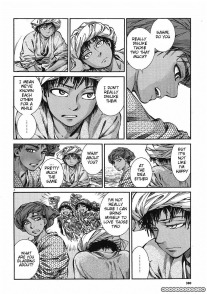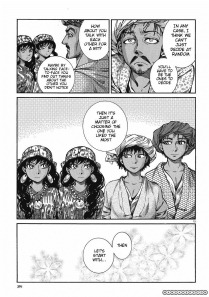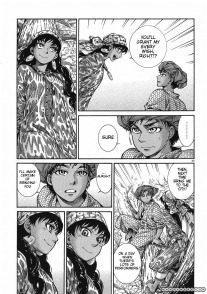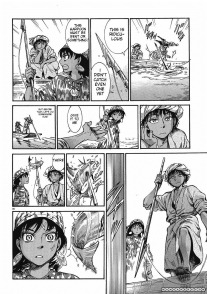 |
 |
 |
There’s really not all that much to say about chapter 21, except that it was pretty much over the top kawaii overload for 47 pages.
The two brothers drafted into being the future husbands on the twins from hell, Layla and Leyli, actually have names – Sahman and Farsahmi. Sahm and Sahmi, as if that weren’t confusing enough – Sahm looks to be the older by about a year (I have no idea which twin is older) and on the whole, they actually seem like a decent match for the adorable but impossible twins – quite blasé about their antics and even-tempered enough to balance out the pairings.
Ah, but those pairings – even with arranged marriages, such things are complicated with two sets of siblings. The fathers are so busy arguing about the finances that no one has thought to figure out which boy marries which girl – including the boys and girls. Most of the chapter is taken up with a ridiculously cute pair of “first dates” where Sahm takes Layla for a test drive, and Sahmi Leyli. Trees are climbed, fish are speared and young love blooms by the sea in such a way as only Mori-sensei could draw it. My favorite moment is when Leyli tells Sahmi “I think I might like you quite a whole lot.”
 |
 |
 |
The miracle of all this is that Mori is able to depict a subject so foreign to a modern industrial world – the arranged marriages of youngsters no more than 14 or so – in such a matter-of-fact and charming way. That should come as no surprise given the sensitivity she displayed with the even more edgy main pairing of the series, but it’s still impressive to see her depict the emotions of these kids in such a winning way. There may even be a tacit suggestion on her part that arranged marriages – especially marrying friends – might not be such a bad thing.
Such is the curse of Otoyomegatari that just as we’ve bonded with these four, we’ll be moving on yet again – though Smith does manage to convince his guide that they must stick around for the wedding (the notion of eating something besides fish is the key element). Once the wedding is done, Smith’s party will be moving on – and so, presumably, will we gentle readers. Whether that will be back to Amira and Karluk (hopefully but probably not) or to the next stop of the road remains to be seen.
 |
 |
 |





Ragez
March 5, 2012 at 10:37 ami hope next chapter will full of food-porn..
Arabesque
March 5, 2012 at 12:39 pmI hope not! I entered a relapse after the last food-porn chapter.
Arabesque
March 5, 2012 at 12:57 pm''The miracle of all this is that Mori is able to depict a subject so foreign to a modern industrial world in such a matter-of-fact and charming way.''
I think that is the one quality Ms. Mori possesses that really makes her story so enjoyable to read. She has an amazing ability to capture the feeling and essence of the times, and when you factor in her excellent artistic ability, it's no wonder she can make a subject look charming and cute.
On the actual chapter, I ended up loling throughout it. I'm also surprised how negative you are about it us focusing on different characters, especially when they are crucial to the core of the story (afterall, Otoyomegatari = Bride's Stories 🙂 Amira, Tarasu and now the twins are all brides are they not ;)? ).
In any case, I doubt that we will move from here without anything crucially important happening to the overall cast, since there must be a reason why Smith must stay here for a long period of time (a chance meeting with Tarasu?) and we might even end up seeing some of the older cast as well.
PS I absolutely loved Ali's reasoning on the last page. LOL
Anonymous
March 5, 2012 at 2:41 pmA big thank you for bringing this manga to my attention. It truly is a good read….and some of the most beautiful artwork ever.
Anonymous
March 5, 2012 at 4:18 pmEheh, it was good chapter.
On the topics of arranged marriages I've come to be of the opinion that blanket pro vs against it blanket statement have relatively little value. I mean… I've seen too many supposed 'for love' marriages go to sh*t with little love left… in some cases even among my close acquaintances and relatives I actually doubt there was any love at all since the beginning . Even some of my close friends did that… more social pressure than their own will or feelings, yet they had to call it love out. Meh. Caòlling it ' arranged marriage' in such cases would have been most honest, really. De facto they were that already.
In the end, be it arranged marriage or not, imho it all boils down to if and how the involved individuals click together. With some luck and compromise XD. Does the relationship work? is the couple in harmony? Who cares how the marriage came to be then.
In our present world if anything I'm more concerned with the consequences of marriage. If the marriage doesn't work the couple should be allowed to divorce and each person being able to start a new life with someone else in case. Or just going the single route. Even in less traditional society I still see a huge stigma attached such life choices.
Back on track with Otoyomegatari: I think Mori, while leaning maybe into the pro camp here, is showing quite well both side of the coin regarding arranged marriages. I do believe the current two couples of siblings will be fine. Amira and Karluk's tender relationship I hope will bloom into a beautiful mutual romance as Karluk matures a little . Pariya sort of has stumbled on a suitable match too.
Tarasu and Amira's sisters instead were not as fortunate. All the most reason for me to root for Tarasu's return in the spotlight, possibly with a not too bleak outcome for her.
Eli
admin
March 5, 2012 at 6:33 pmIndeed, some of the most beautiful manga art I've ever seen.
I'm not negative on the new characters – just pointing out that it's frustrating in a monthly magazine to have so many characters, where you don't see favorites for six months or a year.
And yes, Mori definitely does present both sides of the arranged marriage equation. Actually, the practice isn't completely dead in Japan – some very traditional families still practice it.